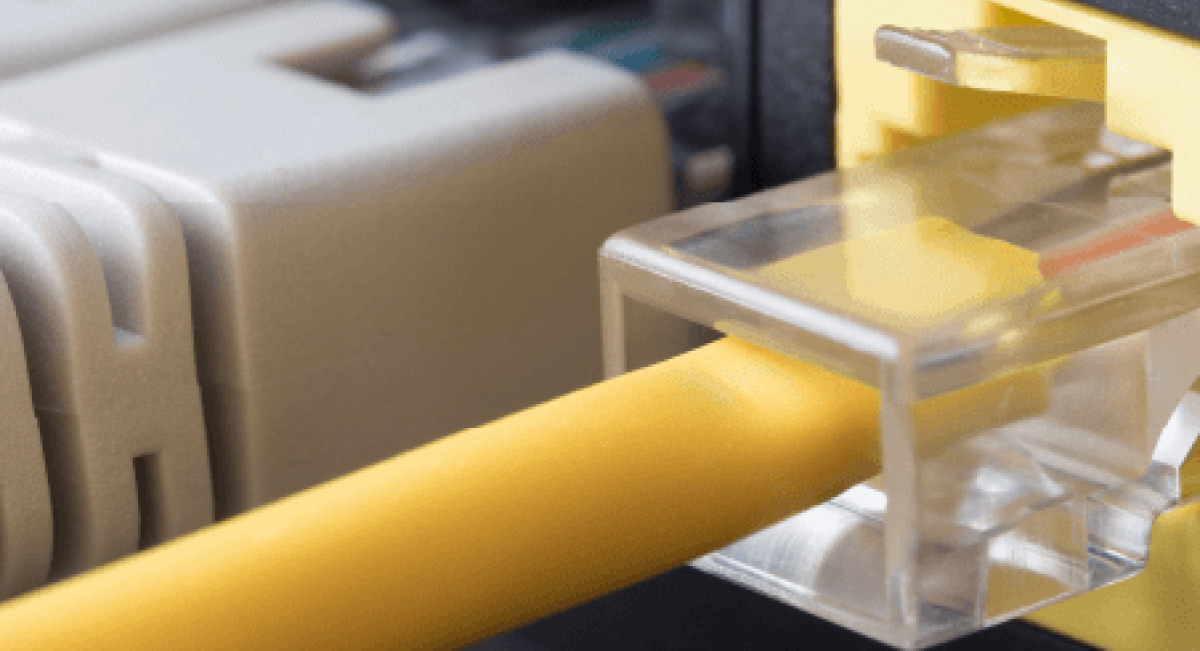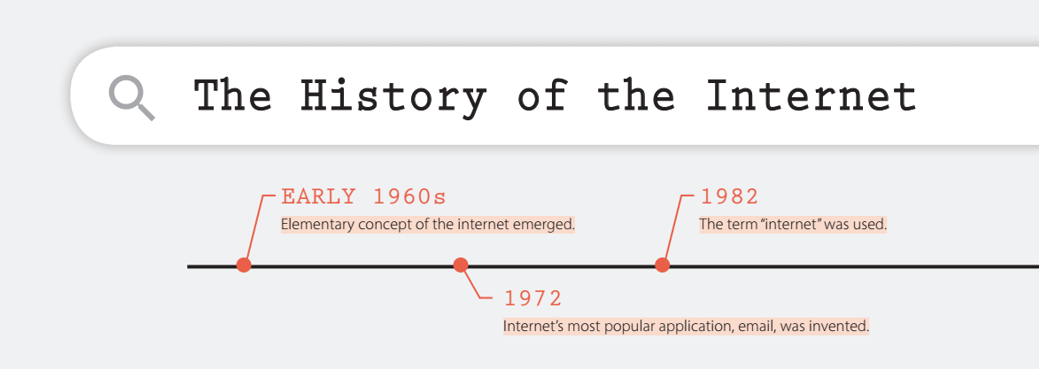
Think about the following questions.
1. During which decade were computers first used in homes?
2. What was the original use of the internet?
3. When did a lot of people worldwide start using the internet?
VOCABULARY PREVIEW
Match each New Academic Word List(NAWL) word with the correct definition.
- span
- transmission _____
- elementary _____
- interface _____
- encode _____
- exponential _____
- a. to change into a set of symbols that can be read by a computer
- b. basic
- c. very fast; increasingly rapid
- d. to cover or include
- e. something sent, especially electronically; a message
- f. a system that controls the way information is shown to a computer user and allows the user to work with the computer
The History of the Internet

Today's young adults are among the first ever born into a world in which internet use is a normal part of everyday life. Over 4.6 billion people around the world are now online. The internet is a powerful tool for information, business, and communication.
The elementary concept of the internet emerged in the early 1960s. It began as a military1 research network and was designed to be decentralized, or spread out over many locations. Thus, if one location was attacked, the military could make transmissions from another location. The first small network went online in 1969 and connected four universities in the US.
This network was very successful from the beginning. Scientists could now share information about their research. In 1972, email was invented and quickly became the internet's most popular application. By the end of that year, the network connected many universities and government research centers. The general public became aware of the network in the late 1970s when a new user interface allowed anyone to get online. People from all over the world joined online groups to talk about thousands of different subjects.
The term "internet" was used for the first time in 1982. New technology had created a common language for the computers on the network. The internet was now recognized as an international network. This was also the time when privacy2 and security started becoming important issues. Hackers, crackers, and viruses began to appear.
In 1990, the original military network went offline, and a year later, the World Wide Web was born. The World Wide Web is an information network that spans the globe, allowing users to access and navigate3 the internet. With the introduction of the Web, the development of the internet accelerated4 at a rapid pace. The source code for the Web was released to the public in 1991, allowing programmers to encode words, pictures, and sounds on Web pages.
In the early 1990s, the first search engine, Gopher, and the first Web browser, Mosaic, were developed, allowing easier and simpler access to the Web. Traffic on the internet saw exponential increases, with an annual5 growth rate of about 340,000 percent.
At the end of the 1990s, Internet2 was born. Internet2 used fiber-optic cables6 to link together a consortium7 of hundreds of high-speed networks around the world. Instead of connecting to the internet only through telephone lines, people could now connect in a wide variety of ways, including by satellite. These new methods had more data-carrying capacity8, or bandwidth, than telephone lines did, making the internet faster and able to convey9 much more information. People could watch TV shows and movies online for the first time.
Another major change occurred in the 1990s: people no longer needed computers to access the internet. The Nokia 9000 Communicator, released in 1996, became the first mobile phone with internet connectivity. By 2008, more internet-connected devices10 were mobile phones than computers, and in 2010, the first-generation iPad added tablets to the mix. Also, information increasingly did not need to be stored on computer hard drives. Instead, it is stored on internet servers around the world, available to download anytime, anywhere. Keeping your information in "the cloud" means that you can always access it, even if your devices are lost, stolen, or destroyed.
The internet will only continue to grow. As of 2021, nearly half of the people on Earth have smartphones, and two-thirds own some kind of mobile device. Experts expect more and more connectivity through more and more types of devices. What are your predictions for the future of the internet?
New Academic Word List
- military 1 : adj. of or relating to soldiers or the armed forces
- privacy 2 : n. the state of being protected from public attention
- navigate 3 : v. to go to different places on the internet in order to find what you want
- accelerate 4 : v. to increase in speed
- annual 5 : adj. yearly
- fiber-optic cables 6 : n. thin threads of glass or plastic that carry very large amounts of information in the form of light signals
- consortium 7 : n. a group of people, companies, etc., that agree to work together
- capacity 8 : n. the ability to hold or carry (something)
- convey 9 : v. to take or carry from one place to another
- device 10 : n. a machine or piece of equipment that has been made for a particular purpose
READING COMPREHENSION
A ‣ Mark each statement as true (T) or false (F) according to the reading.
- The first, small internet network was created in the late 1960s.
- True
- False
- Privacy became a concern in the 1990s.
- True
- False
- Gopher was the first internet browser.
- True
- False
- Internet2 allowed people to watch TV online.
- True
- False
- The first phone that could access the internet appeared in 1996.
- True
- False
B ‣ Choose the best answer according to the reading.
- In paragraph 3, the word application means _____.
- a. request
- b. need
- c. effort
- d. use
- The first computer virus probably appeared in _____.
- a. the early 1970s
- b. the late 1970s
- c. the early 1980s
- d. the early 1990s
- What was Mosaic?
- a. A computer company
- b. A computer virus
- c. A Web browser
- d. A search engine
- What can be inferred from paragraphs 8 and 9?
- a. Less than half of all internet traffic comes from computers.
- b. More people today have tablets than mobile phones.
- c. People in the future will not need computers at all.
- d. Many people find using the cloud too difficult.
C ‣ Put the events in the reading in the correct order (from a to e).
- _____ The first Web browser and search engine were created.
- _____ Government research centers and universities began exchanging information online.
- _____ People could access the internet with phones and tablets.
- _____ High-speed internet using fiber-optic cables appeared.
- _____ The term "internet" was invented.
SUMMARY
Fill in the blanks with the phrases in the box.
- was exponential
- the cloud
- military research
- privacy and security
- able to communicate
- more information
The internet has had a great impact on modern society. The basic idea of the internet came from 1 _____ in the 1960s. The military wanted to be 2 _____ through connections to many locations by computers. As more and more people began using the system during the 1980s, 3 _____ became issues due to viruses and other threats. In the 1990s, the internet's growth 4 _____ thanks to the World Wide Web. Soon afterward, Internet2 and fiber-optic cables made the internet faster and able to carry 5 _____. Now, 6 _____ is replacing the use of hard drives for storing information.
VOCABULARY PRACTICE
Fill in the blanks with the words in the box. Change the form if necessary.
- transmission
- elementary
- interface
- exponential
- span
- encode
- The singer is not just famous in her own country; her popularity _____ three continents.
- Since I only understand French at a(n) _____ level, this book is too hard for me.
- The _____ for a shopping website should be both easy to use and nice to look at.
- Web browsers _____ Web addresses into a form that can be sent over the internet.
- We are receiving a live satellite _____ from the spacecraft traveling around Earth.
- When gold was discovered in parts of California, the state's population experienced _____ growth.
SUPPLEMENTAL READING
Freedom Online

Since the invention of the internet, the extent to which governments should control what can be viewed online has been widely debated. In the early 1990s, many advocates of the internet believed it should be a space free from government control. They argued that individuals should be able to say and do whatever they wanted online.
As more and more of the world's population goes online, however, attitudes have begun to change. Many still believe that freedom of speech on the internet should be protected. However, most now accept that complete freedom from government oversight is unrealistic. Even in countries where freedom of speech is a legal right, governments and courts have long had powers to regulate content in the print and broadcast media—especially in regards to individuals' rights not to be lied about or discriminated against. Many people now want to see such rules more strictly enforced online as well-for both content produced by organizations and individuals.
Some governments control the internet even more tightly. There is a growing list of countries where governments block any content that they believe could be politically or socially damaging. Many in those countries argue that it is a government's duty to protect its citizens in every aspect of their lives, including online.
As the role of the internet in society continues to develop, the limits of government control remain to be seen. What is clear, however, is that the internet has developed very differently than those early internet enthusiasts envisaged.
Fill in the blanks with information from the reading.
- Early _____ of the internet argued that it should be free from government control.
- Many people now accept that government _____ of the internet is necessary.
- Some governments _____ any content they believe is harmful.

Leave a comment
Load more